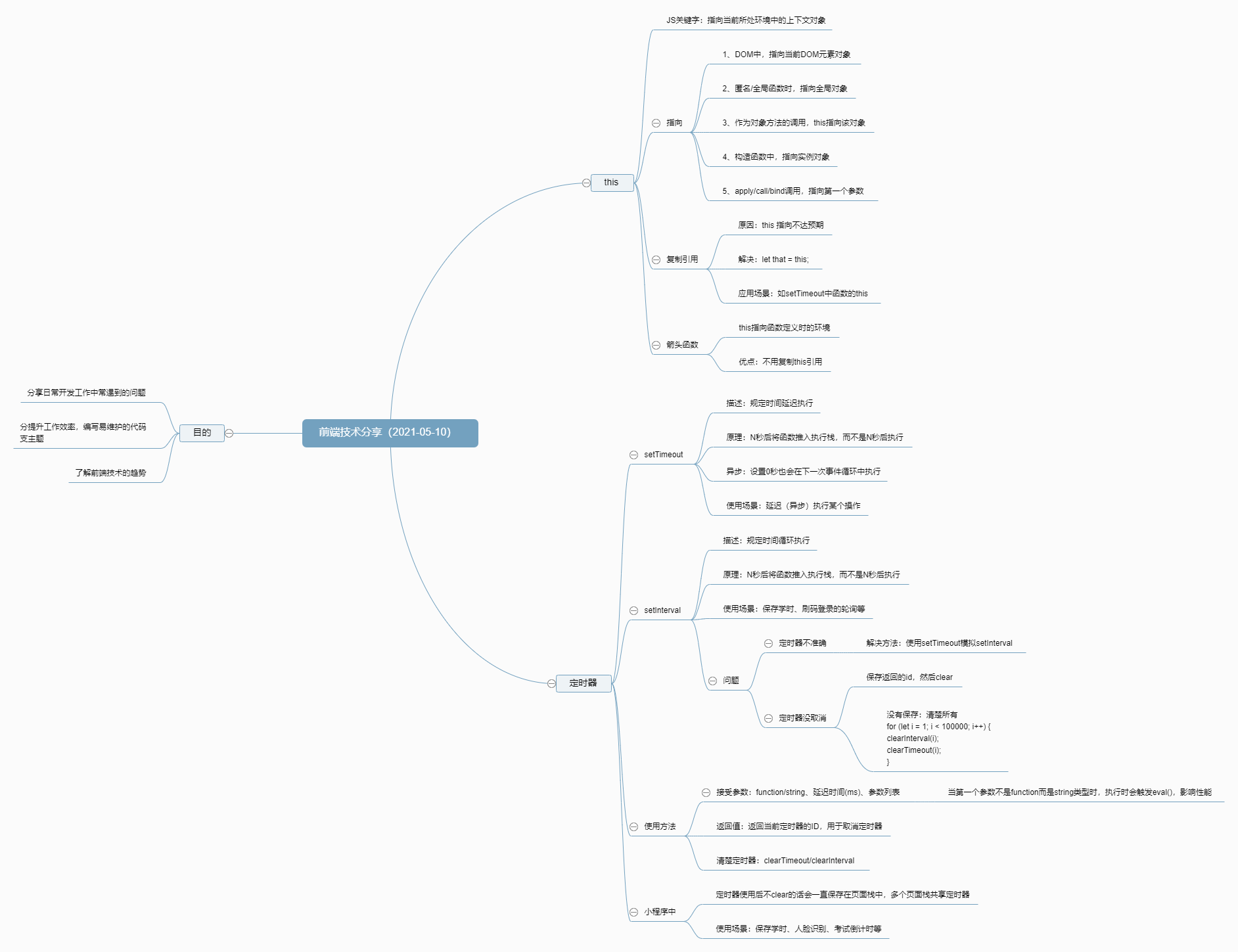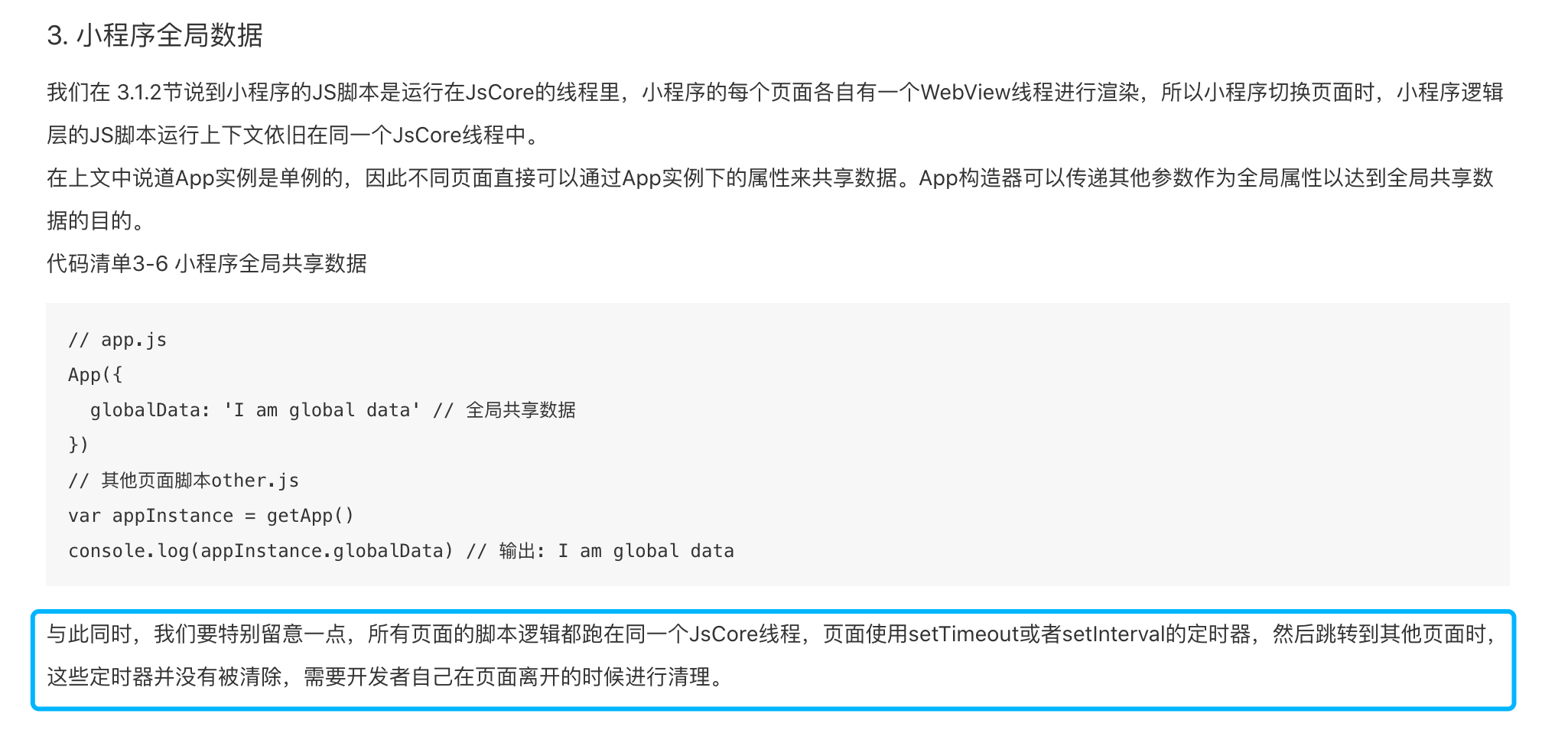JavaScript 专题之 This 和定时器

分享时长:45 分钟分享+15 分钟提问
分享两个在 JS 中非常重要、但又经常遇到问题的两个点。
思维导图:https://naotu.baidu.com/file/7d05ddb397c649f62136040993cbd04b
目的
- 分享日常开发工作中常遇到的问题
- 提升工作效率,编写易维护的代码
- 了解前端技术的趋势
This
JS 关键字:指向当前环境的上下文
1. 事件中的 this
在 DOM 事件中,this指向当前的 DOM 元素对象。
在 HTML 事件(仅为 addEventListener 添加时),this 指向了接收事件的 HTML 元素
<style>
#box {
height: 300px;
line-height: 300px;
text-align: center;
}
</style>
<body>
<div id="box">Hello World</div>
<script>
function bluify() {
console.log(this);
this.style.backgroundColor = "#00CCFF";
this.innerHTML =
this.innerHTML === "Hello World" ? "你好,世界" : "Hello World";
}
box.addEventListener("click", bluify, false);
</script>
</body>
2. 全局函数、匿名函数,this 指向是全局对象
- 浏览器中指向
Window - Node 环境指向
Global
function func() {
console.log(this); // Window or global
}
func();
3. 对象的方法调用
this 指向当前的对象
const xiaoming = {
name: "小明",
getName() {
console.log(this.name);
},
};
xiaoming.getName(); // 小明
4. 构造函数内调用,this 指向实例对象
function Person(name, sex, age) {
this.name = name;
this.sex = sex;
this.age = age;
}
let xiaoming = new Person("小明", "男", 20);
console.log(xiaoming); // { name: '小明', sex: '男', age: 20 }
5. call/apply/bind 调用
this 指向第一个参数
const xiaoming = {
name: "小明",
getName() {
console.log(this.name);
},
};
const xiaohong = {
name: "小红",
};
xiaoming.getName.call(xiaohong); // 小红
this 复制引用
原因: 用于纠正 this 指向不达预期的问题
应用场景: 比如在 setTimeout 中的函数
用法:let that = this;
普通函数 VS 箭头函数
var name = "window";
let obj = {
name: "obj",
outout1() {
let that = this;
setTimeout(function() {
console.log("普通函数", that.name);
}, 1000);
},
outout2() {
setTimeout(() => {
console.log("箭头函数", this.name);
}, 1000);
},
};
obj.outout1(); // 普通函数 obj
obj.outout2(); // 普通函数 obj
因为箭头函数的this是在定义的时候就确定的,使用它可以少写一步 this 指向,推荐使用。
定时器
setTimeout:规定 N 秒后执行
setInterval:规定 N 秒后循环执行
参数
- 函数/字符串、字符串会触发
eval() - 时长毫秒(ms)
- 传入函数的参数列表
传入函数
// setTimeout / setInterval 使用
setTimeout(
(...args) => {
let sum = args.reduce((p, c) => p + c);
console.log(args, sum); //[ 1, 2, 3 ] 6
},
1000,
1,
2,
3
);
// 这段代码的意思是:在 1 秒后将这个函数推入执行栈,然后传递参数1,2,3到函数中
一秒后开始计算 1,2,3 的和,然后输出。
传入字符串
setTimeout("alert(0)", 2000);
可以接受一个字符串,默认通过 eval() 解析后执行,但是 eval 函数非常耗性能,非特殊不推荐。
返回值
返回定时器的 ID ,用于清除定时器。
clearInterval(n);
clearTimeout(n);
setTimeout
核心逻辑:N 秒推入执行栈,而不是 N 秒后执行,
使用场景:延迟执行某个操作时
问题:
- 设置 0 秒也会在下一个宏任务中执行(异步)
- 定时器在 for 中输出 1-10 的坑(forEach 不可跳出循环)
异步
// for & setTimout
for (var i = 1; i <= 10; i++) {
setTimeout(() => {
console.log(i); // ??
}, 1000);
}
因为异步的原因,setTimeout 被延迟到下一次事件循环中执行。
forEach
forEach 不能跳出循环
let arr = [1, 2, 3];
arr.forEach((e) => {
console.log(e);
1, 2, 3;
e += 1;
if (e === 2) {
// break !X
// return !X
}
});
console.log(arr); // [1, 2, 3];
在forEach中使用break、return等都不会跳出循环。
上列操作可以转换为for操作
for (let i = 0; i < arr.length; i++) {
if (arr[i] === 2) {
break;
}
arr[i] += 1;
}
console.log(arr); // [ 2, 2, 3 ]
setInterval
使用场景
- 视频学习的定时保存学时
- 扫码登录的轮询
问题
定时器不准确的原因
- N 秒后推入执行栈,而不是 N 秒后执行
- 会因为前面有代码在执行而导致时间变短
案例代码:
假设有一个 HTTP 轮询,每一秒查询一次数据。
let startTime = new Date().getTime();
let count = 0;
setInterval(() => {
let i = 0;
while (i++ < 10000000); // 假设这里是查询数据带来的网络延迟,用来增加每次函数执行的时间
count++;
console.log(
"与原设定的间隔时差了:",
new Date().getTime() - (startTime + count * 1000),
"毫秒"
);
}, 1000);
代码在执行多次后,定时器会变得不准确,产生误差。
定时器不及时清楚(小程序中)
- 不
clear的话会一直保存在内存中,造成内存泄漏。 - 使用场景:保存学时、人脸识别、考试倒计时等
- 多个页面栈共享定时器

解决方法
定时器不准确
解决方法:使用settimeout模拟setinterval
// 自定义一个定时器
let timer = null;
function interval(func, wait) {
let interv = function() {
func.call(null);
timer = setTimeout(interv, wait);
};
timer = setTimeout(interv, wait);
}
// 使用定时器
interval(() => {
let date = new Date();
console.log("log..", `${date.getMinutes()}: ${date.getSeconds()}`);
}, 1000);
// 清楚定时器
setTimeout(() => {
clearTimeout(timer);
}, 1000 * 6);
定时器太多清楚不掉,造成内存泄漏
解决方法:批量清楚定时器
// 清楚当前页面的所有定时器
for (let i = 1; i < 100000; i++) {
clearInterval(i);
clearTimeout(i);
}
建议及时保存定时器的id,用于清除。